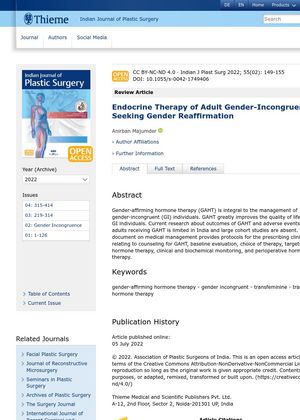Endocrine Therapy of Adult Gender-Incongruent Individuals Seeking Gender Reaffirmation
April 2022
in “
Indian Journal of Plastic Surgery
”

TLDR Hormone therapy greatly improves the quality of life for adults seeking gender reaffirmation, but more research is needed in India.
The document discusses the importance of Gender-affirming hormone therapy (GAHT) in managing gender-incongruent (GI) individuals, stating that it significantly enhances their quality of life. However, it notes that research on the outcomes and adverse events of GAHT in adults, particularly in India, is limited and lacks large cohort studies. The document provides medical management protocols for clinicians prescribing GAHT, including guidelines for counseling, baseline evaluation, therapy choice, hormone therapy targets, clinical and biochemical monitoring, and perioperative hormone therapy.





